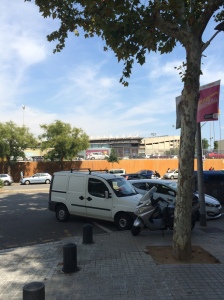Welcome back to Barcelona, Spain!
The past three sessions have been packed with fantastic information, and I hope to bring you all up to date.
To kick off the learning week, we began with the mock press conferences. As I mentioned in the previous post, Dr. Rude explained that as a professional coach, one of the best ways to manage the meta-game is through the press conference. In particular, Dr. Rude discussed that each statement made during a press conference must be directly related to the personal values of the coach.
Specifically, we discussed the Jose Mourinho vs. Pep Guardiola confrontation in the media during the 2010-2011 season. Due to the dominance of FC Barcelona in the ‘game’, Mourinho went to the ‘meta-game’ to try and defeat FC Barcelona and Pep. In the build up to the 2011 UEFA Champions League semi-finals – FC Barcelona vs Real Madrid, Pep finally used the press conference to hit back at Mourinho. It is important to note that it is against Pep’s values to retaliate in such a manner, but in order to defend his players, he took action. After the retaliation, all of Pep’s players applauded him in the locker-room.
During the mock press conferences, each one of us received a description of a situation in which we would have to respond to. For me, I was a newly hired manager of a club and we lost the opening two games of the season. More specifically, I was hired with only a few weeks left during preseason, and during the opening two matches, my team only showed glimpses of good, organized soccer.
In order to make the press conference as realistic as possible, Dr. Rude and my four colleagues asked extremely difficult questions that tested and tried me, but in the calmest way I could, I addressed the questions simply and clearly, and moved from one to the other.The experience was fantastic as I never thought knowing how to execute a press conference would be part of the curriculum in a coaching course.
During sessions on Tuesday and Wednesday, Dr. Rude moved on to teaching us about the next soccer structure, the player. With regards to developing soccer players, we learned that there are three main stages of game understanding that players progressively move through (hopefully) during the course of their soccer careers. The three main stages include, egocentric, summative, and collective.
The egocentric phase primarily revolves around the individual player, which translates to the 6 year old player who receives the ball and tries dribbling through the entire opponent, or the young player who decides to pick the grass because they do not have the ball.
The summative phase still revolves around the individual player, but they begin using their teammates (as secondary options). For instance, a summative player tries to first solve the game situation individually (beating three opponents with a dribble), but if the player discovers that the task is too difficult, they will then seek help from their teammates (passing the ball). As the summative player evolves, their game understanding progresses from an individual mindset to a more team orientated thinking process in which they do not have to execute an individual action before playing with teammates.
Lastly, a player in the collective phase has the appropriate level of game understanding in order to execute the tactical fundamentals necessary for the team to be successful. For instance, the left full-back has the game intelligence to overlap the left winger in order to create a 2v1 situation against the opponents right fullback in an effort to create numerical superiority in the left channel, even though there is a chance the winger will not reward the supporting run. The idea is that in order for the team to operate fluidly and synchronized, each player on the field must move in harmony.
Some of the key points to take away are related to the notion that not every player develops at the same rate, and ALL players pass through each stage of development, but when they enter and exit a stage all depends on the atmosphere in which the players are exposed to. For instance, most FC Barcelona players at the U-14 level are beginning to enter the collective stage, but a U-14 player in California could be entering the summative stage. The idea is that not every U-14 team (or any team) should be exposed to the same type of training session simply because they are the same age.
Two important questions every coach must ask and answer are:
- What level of game understanding (tactical) does the team have?
- What training exercises are needed in order to appropriately grow the game understanding (tactical) of the players (subsequently, the team)?
As you can see, the past three days have been quite intense in terms of the amount of information being taught, but also the depth of the information. The information being taught is truly unique, and each new day brings more motivation to learn more and be better than I was the previous day.
In the next post, be on the look out for inside information from the FC Barcelona U-19 and FC Barcelona B matches!
Thanks for reading.
Brett Uttley
Twitter: @BrettUttley & @TOGSoccer


